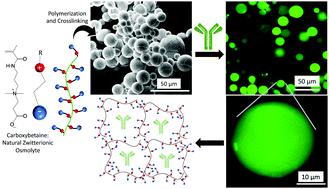当前位置:
X-MOL 学术
›
Soft Matter
›
论文详情
Our official English website, www.x-mol.net, welcomes your
feedback! (Note: you will need to create a separate account there.)
Biodegradable zwitterionic poly(carboxybetaine) microgel for sustained delivery of antibodies with extended stability and preserved function
Soft Matter ( IF 2.9 ) Pub Date : 2021-4-27 , DOI: 10.1039/d1sm00154j
Amir Erfani 1 , Abanoub Hanna 1 , Payam Zarrintaj 1 , Saeed Manouchehri 1 , Katie Weigandt 2 , Clint P Aichele 1 , Joshua D Ramsey 1
Soft Matter ( IF 2.9 ) Pub Date : 2021-4-27 , DOI: 10.1039/d1sm00154j
Amir Erfani 1 , Abanoub Hanna 1 , Payam Zarrintaj 1 , Saeed Manouchehri 1 , Katie Weigandt 2 , Clint P Aichele 1 , Joshua D Ramsey 1
Affiliation

|
Many recent innovative treatments are based on monoclonal antibodies (mAbs) and other protein therapies. Nevertheless, sustained subcutaneous, oral or pulmonary delivery of such therapeutics is limited by the poor stability, short half-life, and non-specific interactions between the antibody (Ab) and delivery vehicle. Protein stabilizers (osmolytes) such as carboxybetaine can prevent non-specific interactions within proteins. In this work, a biodegradable zwitterionic poly(carboxybetaine), pCB, based microgel covalently crosslinked with tetra(ethylene glycol) diacrylate (TTEGDA) was synthesized for Ab encapsulation. The resulting microgels were characterized via FTIR, diffusion NMR, small-angle neutron scattering (SANS), and cell culture studies. The microgels were found to contain up to 97.5% water content and showed excellent degradability that can be tuned with crosslinking density. Cell compatibility of the microgel was studied by assessing the toxicity and immunogenicity in vitro. Cells exposed to microgel showed complete viability and no pro-inflammatory secretion of interleukin 6 (IL6) or tumor necrosis factor-alpha (TNFα). Microgel was loaded with Immunoglobulin G (as a model Ab), using a post-fabrication loading technique, and Ab sustained release from microgels of varying crosslinking densities was studied. The released Abs (especially from the high crosslinked microgels) proved to be completely active and able to bind with Ab receptors. This study opens a new horizon for scientists to use such a platform for local delivery of Abs to the desired target with minimized non-specific interactions.
中文翻译:

可生物降解的两性离子聚(羧基甜菜碱)微凝胶,用于持续递送具有扩展稳定性和功能保留的抗体
最近的许多创新疗法都基于单克隆抗体(mAb)和其他蛋白质疗法。然而,此类治疗剂的持续皮下,口服或肺部递送受到抗体(Ab)与递送载体之间差的稳定性,短的半衰期以及非特异性相互作用的限制。蛋白质稳定剂(渗压剂),例如羧基甜菜碱,可以防止蛋白质内的非特异性相互作用。在这项工作中,合成了与四(乙二醇)二丙烯酸酯(TTEGDA)共价交联的可生物降解的两性离子聚(羧基甜菜碱)pCB基微凝胶,用于Ab封装。所得的微凝胶通过FTIR,扩散NMR,小角度中子散射(SANS)和细胞培养研究。发现微凝胶含有高达97.5%的水含量,并显示出可通过交联密度调节的优异的可降解性。通过评估体外毒性和免疫原性研究了微凝胶的细胞相容性。暴露于微凝胶的细胞显示出完全的生存力,没有白介素6(IL6)或肿瘤坏死因子-α(TNFα)的促炎分泌。使用制造后的加载技术,将免疫球蛋白G(作为Ab型模型)加载到微凝胶中,研究了Ab从各种交联密度的微凝胶中持续释放的过程。释放的抗体(尤其是高交联微凝胶中的抗体)被证明具有完全的活性,并能够与Ab受体结合。该研究为科学家使用这种平台以最小的非特异性相互作用将Abs局部递送至所需靶标开辟了新的视野。
更新日期:2021-05-06
中文翻译:

可生物降解的两性离子聚(羧基甜菜碱)微凝胶,用于持续递送具有扩展稳定性和功能保留的抗体
最近的许多创新疗法都基于单克隆抗体(mAb)和其他蛋白质疗法。然而,此类治疗剂的持续皮下,口服或肺部递送受到抗体(Ab)与递送载体之间差的稳定性,短的半衰期以及非特异性相互作用的限制。蛋白质稳定剂(渗压剂),例如羧基甜菜碱,可以防止蛋白质内的非特异性相互作用。在这项工作中,合成了与四(乙二醇)二丙烯酸酯(TTEGDA)共价交联的可生物降解的两性离子聚(羧基甜菜碱)pCB基微凝胶,用于Ab封装。所得的微凝胶通过FTIR,扩散NMR,小角度中子散射(SANS)和细胞培养研究。发现微凝胶含有高达97.5%的水含量,并显示出可通过交联密度调节的优异的可降解性。通过评估体外毒性和免疫原性研究了微凝胶的细胞相容性。暴露于微凝胶的细胞显示出完全的生存力,没有白介素6(IL6)或肿瘤坏死因子-α(TNFα)的促炎分泌。使用制造后的加载技术,将免疫球蛋白G(作为Ab型模型)加载到微凝胶中,研究了Ab从各种交联密度的微凝胶中持续释放的过程。释放的抗体(尤其是高交联微凝胶中的抗体)被证明具有完全的活性,并能够与Ab受体结合。该研究为科学家使用这种平台以最小的非特异性相互作用将Abs局部递送至所需靶标开辟了新的视野。

































 京公网安备 11010802027423号
京公网安备 11010802027423号